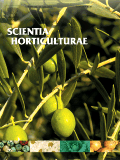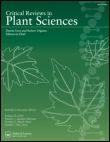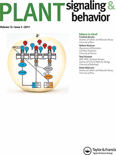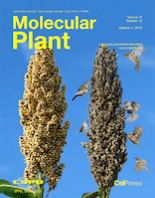
Molecular Horticulture
Scope & Guideline
Bridging Molecular Biology and Horticultural Excellence
Introduction
Aims and Scopes
- Molecular Mechanisms of Plant Development:
Research in this area explores the genetic and molecular basis of plant growth and development, including flowering, fruit ripening, and responses to environmental stimuli. - Stress Responses in Horticultural Crops:
The journal emphasizes studies on how plants respond to abiotic and biotic stresses, including drought, salinity, and pathogen resistance, contributing to improved crop resilience. - Genomic and Genetic Studies:
A core focus is on genome analysis and genetic improvement techniques such as CRISPR, functional genomics, and molecular markers that facilitate the breeding of horticultural crops. - Biochemical Pathways and Metabolomics:
Research highlights the biochemical pathways involved in the synthesis of secondary metabolites and their roles in fruit quality, flavor, and plant defense mechanisms. - Innovative Horticultural Practices:
The journal promotes studies on novel practices and technologies in horticulture, including genetic transformation, bioinformatics, and multi-omics approaches to enhance crop production.
Trending and Emerging
- CRISPR and Genome Editing Technologies:
There is a notable increase in research utilizing CRISPR and other genome editing technologies to enhance traits in horticultural crops, reflecting a shift towards precision breeding. - Metabolomics and Secondary Metabolite Research:
An emerging trend is the focus on metabolomics, particularly the role of secondary metabolites in plant health and quality, which is vital for improving crop resilience and marketability. - Multi-Omics Approaches:
The integration of transcriptomics, proteomics, and metabolomics in horticultural studies is gaining traction, providing comprehensive insights into plant responses and development. - Abiotic Stress Tolerance Mechanisms:
Research exploring the molecular mechanisms behind abiotic stress tolerance, such as drought and salinity, is increasingly relevant, especially with climate change impacts on agriculture. - Functional Genomics in Crop Improvement:
There is a growing emphasis on functional genomics to elucidate the roles of specific genes in horticultural traits, paving the way for targeted genetic improvements.
Declining or Waning
- Traditional Breeding Techniques:
Research related to conventional breeding practices appears to be waning, as the field increasingly shifts towards molecular and genomic approaches for crop improvement. - Basic Plant Physiology:
While foundational knowledge remains important, studies solely focused on basic physiological processes without a molecular or genomic context are becoming less prominent. - Postharvest Biology without Molecular Insights:
Papers focusing on postharvest processes without integrating molecular biology perspectives are less frequently published, indicating a trend towards more molecularly-driven postharvest research.
Similar Journals

Horticulture Research
Leading the way in horticultural research and discovery.Horticulture Research, published by Oxford University Press Inc, is a leading open-access journal dedicated to advancing knowledge in the fields of horticulture, plant science, and related biotechnological disciplines. Since its inception in 2014, the journal has rapidly established itself as a premier outlet for research, boasting prestigious Q1 rankings across multiple categories including Biochemistry, Biotechnology, Genetics, Horticulture, and Plant Science in 2023. With exceptional Scopus rankings—placing it in the top 2% of Horticulture journals and 4% for Plant Science globally—Horticulture Research provides a vital platform for scholars, professionals, and students to disseminate and engage with innovative findings. Emphasizing the importance of open accessibility, the journal allows for widespread dissemination of impactful research, making it an invaluable resource for those striving to enhance sustainable horticultural practices and plant-based innovations. Its aim to bridge the gap between theoretical study and practical application reflects the dynamic nature of the horticultural sciences today.

SABRAO Journal of Breeding and Genetics
Connecting researchers to drive genetic advancements.SABRAO Journal of Breeding and Genetics is a premier academic platform dedicated to fostering research and dissemination in the fields of agronomy, animal science, biotechnology, and genetics. Published by the SOC ADVANCEMENT BREEDING RESEARCHES ASIA & OCEANIA in Japan, this esteemed journal has an ISSN of 1029-7073 and E-ISSN of 2224-8978. Operating under open access, it aims to enhance the visibility of high-quality research while encouraging innovative advancements in breeding and genetics studies. With remarkable quartile rankings in 2023, including Q3 in Agronomy and Crop Science and Biotechnology, the journal is an essential resource for researchers, professionals, and students aiming to stay informed about the latest scientific developments. Covering diverse topics in a converged timeline from 2008 to 2024, it offers a comprehensive outlook on the challenges and advancements shaping the future of agricultural and biological sciences.

SCIENTIA HORTICULTURAE
Transforming horticulture through groundbreaking research.SCIENTIA HORTICULTURAE, published by Elsevier, is a leading journal in the field of horticulture, with an impressive impact factor reflected in its Q1 ranking (2023) and position as #6 out of 115 in the Scopus category for Agricultural and Biological Sciences. This journal plays a pivotal role in disseminating cutting-edge research and innovations in horticultural science and technology, contributing significantly to the understanding of plant cultivation, production, and management. With continuous publication since 1973, SCIENTIA HORTICULTURAE offers an essential platform for researchers, professionals, and students alike who are focused on the advancement of sustainable horticultural practices. Although it is not an open-access journal, it provides a wealth of data and findings that can be accessed through institutions and libraries. Located in the Netherlands at RADARWEG 29, 1043 NX AMSTERDAM, this journal remains an invaluable asset to the global horticultural community throughout its converged years, fostering collaboration and elevating standards in horticulture research.

CRITICAL REVIEWS IN PLANT SCIENCES
Unveiling the complexities of plant systems.CRITICAL REVIEWS IN PLANT SCIENCES, published by Taylor & Francis Inc, is a prestigious journal that has been advancing the field of plant science since its inception in 1983. With an impressive impact factor and consistently ranked in the top quartile (Q1) of its category, this journal is a leading platform for the dissemination of peer-reviewed research that spans the breadth of plant biology, ecology, and agricultural applications. Housed in the United Kingdom, it serves an international readership, making significant contributions to our understanding of plant systems and their environmental interactions. This journal is highly regarded within the Scopus rankings, holding an impressive position of 18 out of 516 journals in the Agriculture and Biological Sciences category, placing it in the 96th percentile. Although not currently open access, the journal provides valuable insights and critical reviews that are essential for researchers, professionals, and students striving to further their knowledge and bolster their own research in plant sciences.

Plant Signaling & Behavior
Bridging Science and Nature: The Language of PlantsPlant Signaling & Behavior is a prestigious journal published by TAYLOR & FRANCIS INC, dedicated to advancing the understanding of the complex signaling mechanisms and behavioral responses of plants. With an ISSN of 1559-2316 and an E-ISSN of 1559-2324, it has firmly established itself in the field of Plant Science, earning a Q1 ranking in the 2023 category quartiles and ranking #83 out of 516 in Agricultural and Biological Sciences, placing it in the 84th percentile according to Scopus metrics. The journal serves as a vital platform for researchers and professionals looking to publish innovative studies and reviews that explore the intricate relationships between plant behavior and environmental signaling. With coverage spanning from 2006 to 2024, Plant Signaling & Behavior not only enhances academic discourse but also supports the growing interdisciplinary nature of plant sciences. Although the journal is not open access, it remains a significant resource for students, researchers, and practitioners aiming to deepen their understanding of plant signaling and its implications for ecology and agricultural practices.

Molecular Plant
Pioneering discoveries at the intersection of biology and agriculture.Molecular Plant, published by CELL PRESS, is a premier journal dedicated to advancing the field of molecular biology and plant science. With an impressive impact factor reflecting its rigorous peer-review process and the high quality of its published research, this journal has achieved a remarkable Q1 ranking in both Molecular Biology and Plant Science categories as of 2023. Its Scopus rankings place it within the top echelons of its field, holding 2nd place in Agricultural and Biological Sciences - Plant Science, showcasing its vital role in disseminating impactful research. The journal covers a broad range of topics, including but not limited to, plant genetics, molecular interactions, and biotechnological advances. Research published in Molecular Plant has the potential to significantly influence agricultural practices and biotechnological applications, making it an essential resource for researchers, professionals, and students eager to stay at the forefront of plant research. Access options for the journal are tailored to accommodate a wide audience, facilitating engagement with cutting-edge findings and breakthroughs. As the field of plant science continues to evolve, Molecular Plant remains integral to fostering innovation and collaboration within the scientific community.

PLANTA
Exploring the intricate world of plant genetics.PLANTA, published by SPRINGER, stands as a pivotal journal in the field of plant sciences and genetics, known for its rigorous peer-reviewed research that has influenced the advancement of botanical science since its inception in 1925. With an impressive trajectory of convergence from the years 1925 to 1945, and again from 1947 to 2024, this journal maintains a strong reputation, currently categorized in the prestigious Q1 tier of Plant Science and Q2 tier in Genetics as of 2023. The journal is recognized for its high impact, ranked #64 out of 516 in Plant Science by Scopus, representing the top 87th percentile within its category, while also securing a strong position in Genetics with a #92 rank. The journal serves as a critical resource for researchers, professionals, and students who are eager to explore the complex genetics, biochemistry, and evolutionary biology of plants. Though primarily subscription-based, the quality of the research published in PLANTA makes it an essential reading for anyone serious about advancing their knowledge and understanding of plant sciences.

Horticultural Plant Journal
Nurturing Insights in Horticulture and EcologyThe Horticultural Plant Journal, published by KEAI PUBLISHING LTD, stands at the forefront of horticultural research and innovation. With an ISSN of 2095-9885 and an E-ISSN of 2468-0141, this open access journal has been committed to disseminating significant findings in horticulture since 2015. As of 2023, it proudly holds prestigious Q1 rankings across multiple categories, including Biochemistry, Genetics and Molecular Biology, Ecology, and Plant Science, reflecting its impactful contributions to diverse scientific fields. Located in Beijing, China, the journal not only facilitates groundbreaking studies but also provides crucial insights into sustainability and environmental issues, being ranked in the top tiers of relevant disciplines. This makes it an invaluable resource for researchers, professionals, and students who aim to stay at the cutting edge of horticultural science, offering them the latest research that informs both academic understanding and practical application.

Plant Stress
Exploring the Resilience of Flora Under StressPlant Stress is a prestigious academic journal published by Elsevier that focuses on the critical study of stress responses in plants, bridging vital areas such as ecology, evolution, and plant science. With its ISSN 2667-064X, this journal serves as an essential platform for researchers and professionals seeking to explore innovative findings and advancements in plant stress biology. Its notable rankings in the Q1 category for both Ecology, Evolution, Behavior, and Systematics and Plant Science as of 2023 further establish its significance, being recognized in the top quartile of its field. The journal’s impressive Scopus ranks, including Rank #144/721 and Rank #107/516 in the respective categories, highlight its influence and the quality of research it disseminates. While currently not offering Open Access, Plant Stress is instrumental in fostering academic dialogue and collaboration among researchers worldwide, with implications that extend beyond theoretical studies into practical applications in agriculture and environmental management. For those dedicated to understanding plant resilience and stress adaptation, Plant Stress is an indispensable resource.

MOLECULAR BREEDING
Pioneering Research in Plant Science and BiotechnologyMOLECULAR BREEDING is a prestigious journal published by Springer, dedicated to advancing the field of agronomy, plant science, and biotechnology through innovative research contributions. With an impressive ISSN of 1380-3743 and E-ISSN 1572-9788, this journal has continuously served the scientific community since its inception in 1995. Operating from the Netherlands, MOLECULAR BREEDING is recognized for its high impact factor and status in the Q1 quartile for both Agronomy and Crop Science and Plant Science in the latest 2023 metrics, highlighting its influential role in these domains. With strong Scopus rankings reflecting its position within the top percentiles of various related fields—including a notable 81st percentile in Plant Science—this journal is essential for researchers, professionals, and students striving to understand and innovate in molecular genetics and breeding techniques. Although it does not provide open access, its rigorous peer-review process ensures that published articles maintain the highest standards and contribute significantly to the scientific discourse. The journal’s diverse scope encompasses significant advancements in molecular biology and genetics, ultimately supporting the global objectives of sustainable agriculture and enhanced crop resilience.